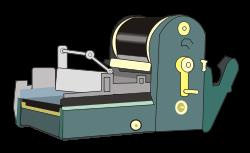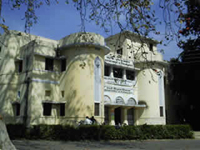Latest Contributions
The Ghost – in Lucknow
Category:
Tags:

Anand has been a print and broadcast journalist in Canada. His translations of Hindi fiction into English have been published by Penguin India and Rupa Books. He has also translated Canadian fiction writers, including the 2013 Nobel Prize winner Alice Munro into Hindi. He divides his time between Montreal, Canada and Lucknow, India.
The Ghostwas a newspaper that I wrote, published and circulated. Add to it the job of stencil cutting for printing on a cyclostyle machine, and you have the ideal candidate for the position of chief cook and bottle washer.
The place of its birth was Lucknow, the ‘City of Nawabs' 500 km southeast of Delhi, and the capital of Uttar Pradesh, the most populous state in India. Renowned as a centre of language, poetry and fine arts, Lucknow was also a centre of higher education, with University of Lucknow being a top-rated university in India. Formed in 1920, the University included the nationally renowned King George's Medical College and Isabela Thoburn (IT) College for women. The University had been a hotbed of radical protest during the national movement under the British raj. The University's good reputation in the fields of social sciences and humanities lasted until the 1960s, when agitations by self-serving student leaders brought the academic activity to a standstill for some time.
In 1965, I had just entered Lucknow University for my MA degree. In BA, I had studied English literature, and it had opened my eyes to a whole new world. Although literature and language, as I later found, was my vocation, I had opted for graduate studies in Philosophy. I wanted the answer to one of mankind's primeval questions: What is the meaning of our existence?
Those were heady days. I was hardly dry behind the ears but had stars in my eyes and dreams of becoming famous. Being in a university, I felt was being on the brink of important events and development. The sky was the limit of what I could achieve.
My own newspaper was to be my ticket to fame. English newspapers ruled the print media. My newspaper, therefore, had to be in English.
The seed of the idea of publishing a newspaper had been planted in my mind after reading the great English essayists of the 18th century: Addison, Lamb, and Hazlitt. The story of the 18th century periodicals, The Tattler and The Spectator, helped that seed to grow and flower.
The Ghost was brazenly styled after the periodicals that had inspired it. The Spectator had used a fictional method of presentation through a "Spectator Club," whose imaginary members extolled the authors' own ideas about society.
The Ghost had imaginary associates who reported to an unseen, all-seeing eye that watched and knew everything happening in the university. Mr. Spectator was an "observer" of the London scene\; The Ghost was an observer of the Lucknow University scene.
My newspaper was printed on one sheet of foolscap paper.
The content of most of The Ghost's observations is now lost in the far reaches of memory. There were several sections or boxes on that foolscap sheet, which gave a taste of things to come. One item was going to be an exposé of things taking place on the campus.
The first of these exposés, had The Ghost lived beyond its first and only edition, would have been about a group of students from the Department of English who took part in high-flown extra-curricular activities. One of these activities was a moot court, based on simulated court proceedings in which participants played roles of prominent members of society and discussed matters of local and national importance. Another was to stage plays such as Abelard and Heloise, the story of a tragic love affair that was inaccessible to the majority of students.
This group had some good-looking girl students. My intention was to portray the group as rather snobbish - a group that kept away from the hoi-polloi who did not speak fluent English.
I realize now that I clearly was envious of their camaraderie but too shy to join them. I was waiting perhaps for them to discover me and invite me to join the group. Therefore, some frustration on my part and writing about the group out of spite could not be ruled out.
Another item in The Ghost, labelled "Personalities", was modelled after Time magazine's last page that had snippets about people in the news, which in my case would have been the students in the university.
I planned The Ghost as a covert operation - no one was to know who had brought it out. Hence, both printing and circulation were to be done anonymously. Photocopying machines were still a few years away. The only way was to print the newspaper on a cyclostyle. In the cyclostyle duplicating process, a stencil, which serves as the master copy, is cut by a typewriter on a special paper that serves as a printing form. The printing is done by forcing ink through the stencil onto paper.
Although I had cut the stencil myself, a cyclostyle machine was needed to print it. I decided that all the shops doing cyclostyle printing were not safe\; I was afraid that this could lead to my being identified as the man behind the newspaper. Fortunately, I had an acquaintance who worked in an office at the Lucknow medical college, which had a cyclostyle machine. I confided in him but did not disclose what needed to be cyclostyled.

A cyclostyling machine
One evening, when the office had closed for the day, I went there with him and used the cyclostyled machine. Some sheets were not properly printed. I made sure that every spoiled sheet was collected and dumped in the garbage\; I left no tell-tale signs left behind. The man who was helping me noticed my furtive gathering of the spoiled sheets, but said nothing. The first part of the cloak and dagger operation was over.
Distributing the paper was fraught with bigger challenges. Had I done it myself, the power behind The Ghost would have been unmasked. I thought of several ways to circulate the paper incognito. One that I still remember, and laugh at, was named Operation Whirlwind. There was a corner in the upper story of the university quadrangle where a strong draft hit a terrace. I thought of placing a stack of the papers on a ledge in path of the draft, and letting the wind shower the quadrangle with sheets of The Ghost. Other methods of distribution now escape my mind, but they too were equally fanciful.
Before long, I again sought the good offices of the acquaintance that had helped me earlier. He took me to a cycle-repair shop behind the university campus, and introduced me to the owner. The owner recruited two men for me to distribute the newspaper in the campus. The payment for this job was going to be half a rupee per person.
I handed a stack of The Ghost to the two men surreptitiously behind the university canteen. They were to distribute the paper all over the campus. We set a place to meet in a couple of hours.
None of the men showed up at the appointed hour. Finally one of the men appeared. He told me that he had been taken to the university proctor's office for distributing something unauthorized in the campus without prior permission. His stack of papers was confiscated, and he was let go after a warning.
My hopes were now pinned on the second man. When the second man did not show up after a long wait, I went to the cycle-repair shop. The owner told me, rather agitatedly, that the second man had been handed over to the police for the same crime as the first one.
I told the man that I would take care of the situation, and before he could reply, escaped on my bicycle. I have never pedalled so hard in my life as I did that day. I was sure that I too would be apprehended. I rode through lanes and making sudden turns and backtracking, hoping to spot and shake off a posse of policemen that - I was sure - was hot on my trail.
The rest of the day was spent with much trepidation. Although I was in the safe environs of my home, every knock and every loud noise made my heart sink with an ominous feeling that the police had finally caught up with me. Next day, the fear subsided a little, and I felt bold enough to visit the scene of my crime. In those days, I wore only white clothes most of the year. I borrowed a colourful shirt from a cousin and wore it, hoping to throw off scent those who, in my imagination, were looking for me.
I gingerly went to the university campus, with sun-glasses concealing half of my face. There seemed to be no unusual activity. There were no signs of a man-hunt, no ‘wanted' posters offering a reward for the capture of the person or persons behind The Ghost, no gaggle of students excitedly talking about the mysterious happening in the campus the day before.
My attempt to emulate the success of The Tattler and The Spectator was unceremoniously nipped in the bud.
Later, I was the editor of the journal of the University's Department of Psychology and Philosophy for the next three years.

The Psychology and Philosophy building of Lucknow University.
This journal was in fact begun by me and was decently printed at a printing press. I was able to successfully solicit articles from several respected academicians. Although it brought me considerable praise, it lacked the thrill and sense of adventure of the cyclostyled clandestine sheet.
_______________________________________
© Anand 2014
Comments
Add new comment